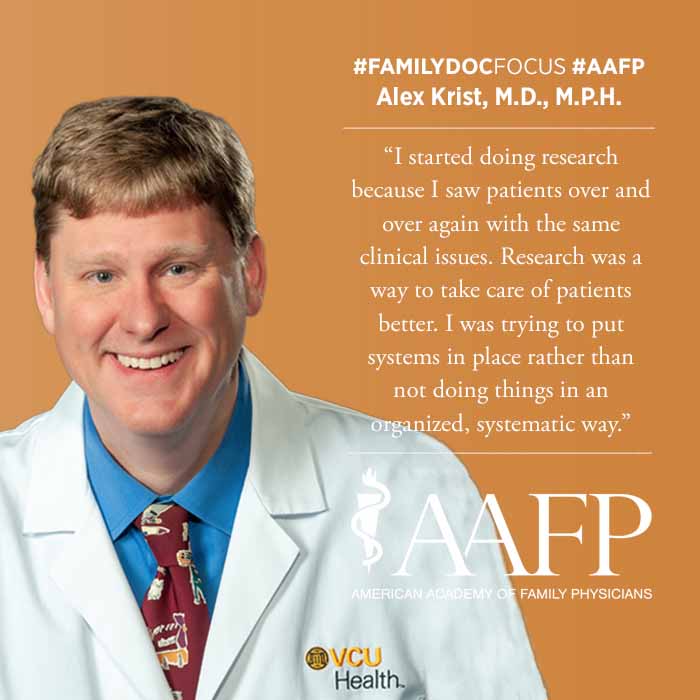Family Physician Researcher, Mentor Takes Reins of USPSTF
April 06, 2020 03:00 pm David Mitchell – Alex Krist, M.D., M.P.H., has helped train more than 180 family medicine residents in the past two decades, but his contributions to primary care go far beyond that, affecting the way thousands of family physicians practice medicine.

Krist, one of five family physicians on the 16-member U.S. Preventive Services Task Force, was recently appointed chair of the USPSTF, the independent, volunteer panel of primary care and prevention experts who make evidence-based recommendations about clinical preventive services. Krist has been a member of the task force since 2015 and had served as its vice chair for the past two years.
"I'm so grateful to serve and help make the task force recommendations, which are so important to me as a clinician," said Krist, a professor in the Department of Family Medicine and Population Health at Virginia Commonwealth University who also has been faculty at VCU's Fairfax Family Practice Residency since 1999. "I've been following the task force's recommendations for decades."
Krist has directed the Virginia Ambulatory Care Outcomes Research Network at VCU since 2011, and the USPSTF was a focal point for his research well before he joined the task force.
"We do a lot of chronic care, mental health and social determinants of heath research, but a big emphasis has been on implementing evidence-based care and how to make the right care for patients easy and straightforward for practices," he said.
Krist's interest in research was piqued by a desire to improve clinical practice.
"I started doing research because I saw patients over and over again with the same clinical issues," he said. "Research was a way to take care of patients better. I was trying to put systems in place rather than not doing things in an organized, systematic way."
For example, Krist said that early in his practice, if he saw 24 patients in a day, five to 10 of those visits would involve discussing the potential harms and benefits of prostate cancer screening with male patients. Krist published a study in 2007 that showed that providing patients with information before their visits increased their knowledge of the harms and benefits of screening and decreased their level of conflict in deciding whether to be screened.
"It made no sense to discuss it over and over again," he said. "The idea was, let's try to get patients information before their visit and get them more engaged in their own care."
It wasn't always a given that Krist would be a family physician. He worked as an emergency medical technician for eight years in college and medical school.
"A lot of people thought I would do emergency medicine," he said. "I really enjoyed it, but I fell in love with family medicine and the concept of whole-person care in medical school. I like the family medicine mindset and philosophy of making evidence-based decisions in the context of the patient and their values."
Now task force members are charged with making their evidence-based recommendations -- in addition to working at their day jobs -- amid the crisis of a pandemic. The task force makes recommendations on more than 80 topics and strives to update them every five years. Each year, the task force aims to publish draft recommendations on 15 topics and final recommendations on 15 more. Krist said he doesn't expect those goals to change.
"It's challenging to keep things moving," he said, "but I think we'll be able to do it."